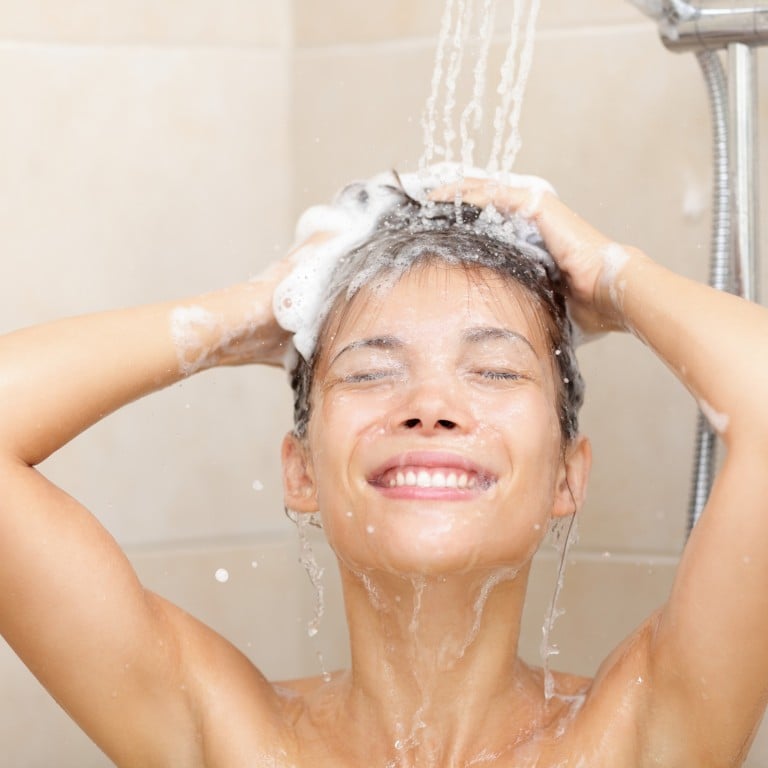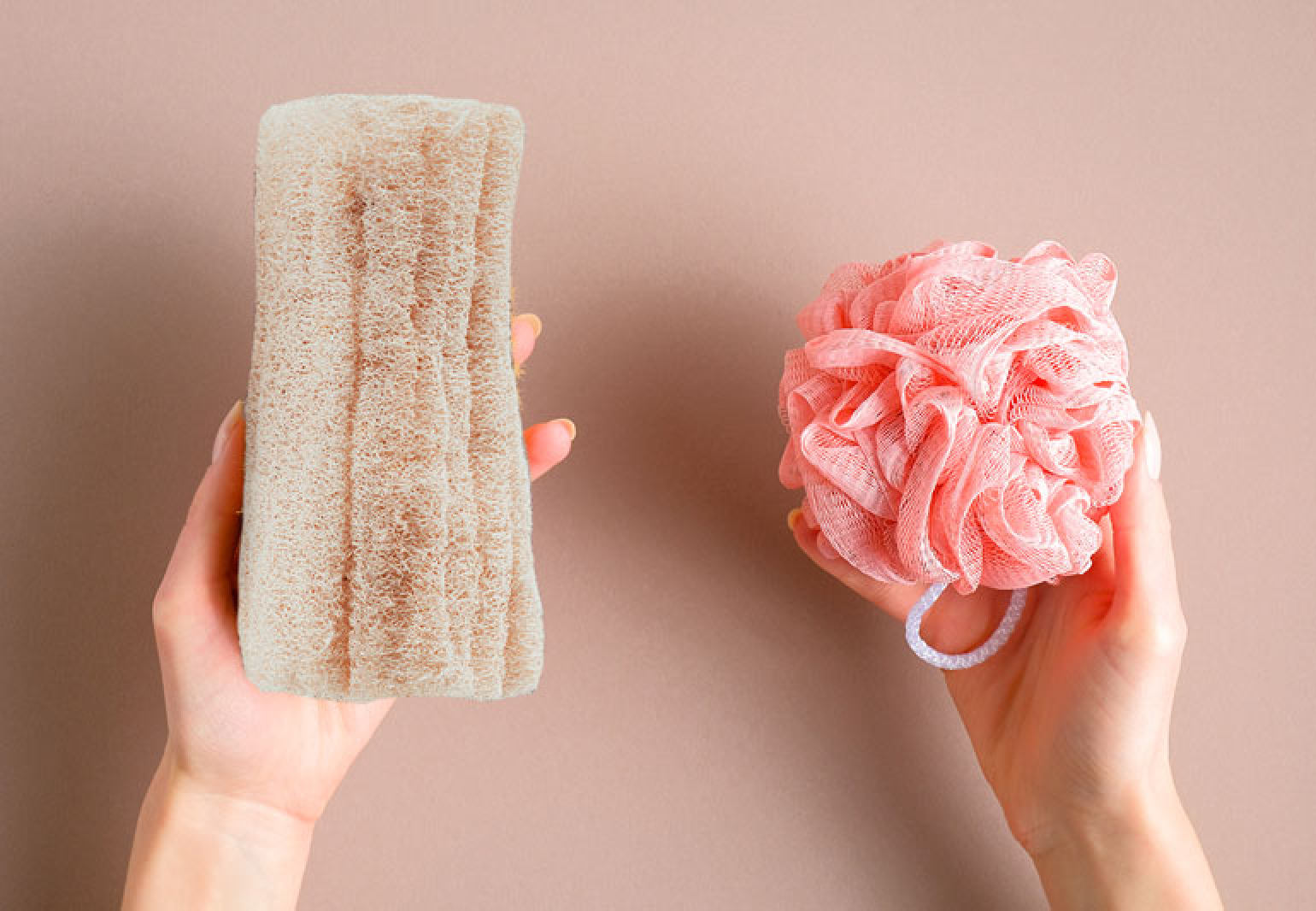
Do you shower the right way for healthy hair and skin? From how hot the water is to moisturising and exfoliating, what you need to know
- There’s more to showering than soap and hot water; your routine can affect the health and look of your skin and hair
- From getting rid of bacteria-breeding sponges to brushing your hair and moisturising at the right time, these tips will keep your hair and skin healthy
While you may think there’s not much science to it, your shower routine should involve much more than simply washing and rinsing.
The same way you plan and build a skincare routine to match your needs, the perfect shower routine involves being aware of certain dos and don’ts that can help you reach your radiant skin goals and dreams.
Your daily shower sets the note for your skin’s overall health and strength, so next time you hop in it, make sure to consider some of these tips and tricks.
Keep things lukewarm and pH balanced

“Most hair and scalps do best with lukewarm water – hot water can irritate your scalp, causing dryness and other negative reactions,” says Christina Carlsson, stylist and lead pro educator at haircare brand Amika, adding that to keep hair colours vivid, stylists recommend using cooler water temperatures after shampooing to reduce colour fading.
On top of that, it’s important to use gentle and non-abrasive soaps. “Using a soap bar that isn’t pH balanced can quickly strip skin of its protective acid mantle, leading to dry, rough, sensitive skin,” says Dr Audrey Kunin, a board certified dermatologist and the founder of DermaDoctor.
Wave your loofahs goodbye
Your bathroom, no matter how ventilated, is a wet, damp place – especially after you shower. Tools such as sponges, brushes, loofahs and bath towels that live in humid environments are the perfect growth media for bacteria.
“Reusing the same flannel day in and day out as it sits there wet in the shower … don’t do that! It can be mould city and introduce a breeding ground of bacteria into your face and body,” says Lisa Fennessy, founder of blog This Organic Girl. She also recommends staying away from sonic brushes as they can also become breeding grounds for bacteria.

By using these tools every day, instead of helping with the cleansing process, you’re spreading bacteria all over your body, which can end up causing irritation, itchiness and infections.
So what to use instead? Dermatologists recommend soft bristle shower brushes, as you can use a mix of hydrogen peroxide and alcohol to clean them and keep them bacteria-free. Flannels are another good option, but only if you make sure to wash them after every single use.
Moisturise right after

When you get out of the shower your body holds a higher moisture concentration than the air around you – even more so during winter – and given that water tends to move from higher concentrations to lower concentrations, it comes as no surprise that the water in your skin quickly evaporates into the air, dehydrating you as a consequence.
That’s why you should apply a moisturiser right after you’re finished showering if you want to keep your skin healthy and full of glow. Body oils can also be helpful if your goal is to keep your skin from easily dehydrating.
“If you are using body oils or face oils to moisturise, you want to apply them to damp skin straight out of the shower,” Fennessy says. “Oils do not traditionally contain water so you need to add that in if you are looking to hydrate the skin using oils only.”
Moisturisers and oils are made to trap water particles and help lock them inside your skin, so by applying them when your skin is still damp, you’ll be able to create a sort of protecting shield that will stop water from evaporating once you’re out of the shower.

Brush your hair before it gets wet
No matter your hair type or length, brushing your hair before you jump in the shower when it’s still dry is key to keeping it healthy and frizz-free.
By brushing before getting your hair wet you’re not only reducing the chance of hair loss in the shower, but also avoiding damaging breakage, and further tangling it once it gets wet. Your hair is at its weakest and most susceptible state when it’s soaked in water, and using a brush on it can eventually overstretch it, break it and tear it apart.
“Before you shower, you should take a moment to completely detangle your hair to make it so much easier to get the shampoo throughout your whole scalp without the tangling getting in your way,” says stylist and Amika educator Aoife McCarthy.
If you still prefer to comb your hair while in the shower, make sure to do so when you apply conditioner, untangling strands with either your fingers or a wide-tooth comb to avoid pulling. “This is when you can take your big comb or wet brush and work the product through your hair to make sure it’s evenly dispersed and it will help you detangle,” McCarthy explains.
Exfoliate your way to radiant skin
Our skin cells are constantly renewing; new cells are born as old ones in the outer layers of your skin die. Removing this coating of dead cells is essential to keeping your skin looking bright and avoiding dull, dry texture, clogged pores and acne, and the way to accomplish that is by exfoliating.

“Use a body scrub that contains chemical exfoliating ingredients before showering,” says Kunin, pointing out how this can help improve your skin’s texture. “It will leave skin smooth, soft and glowing.”

